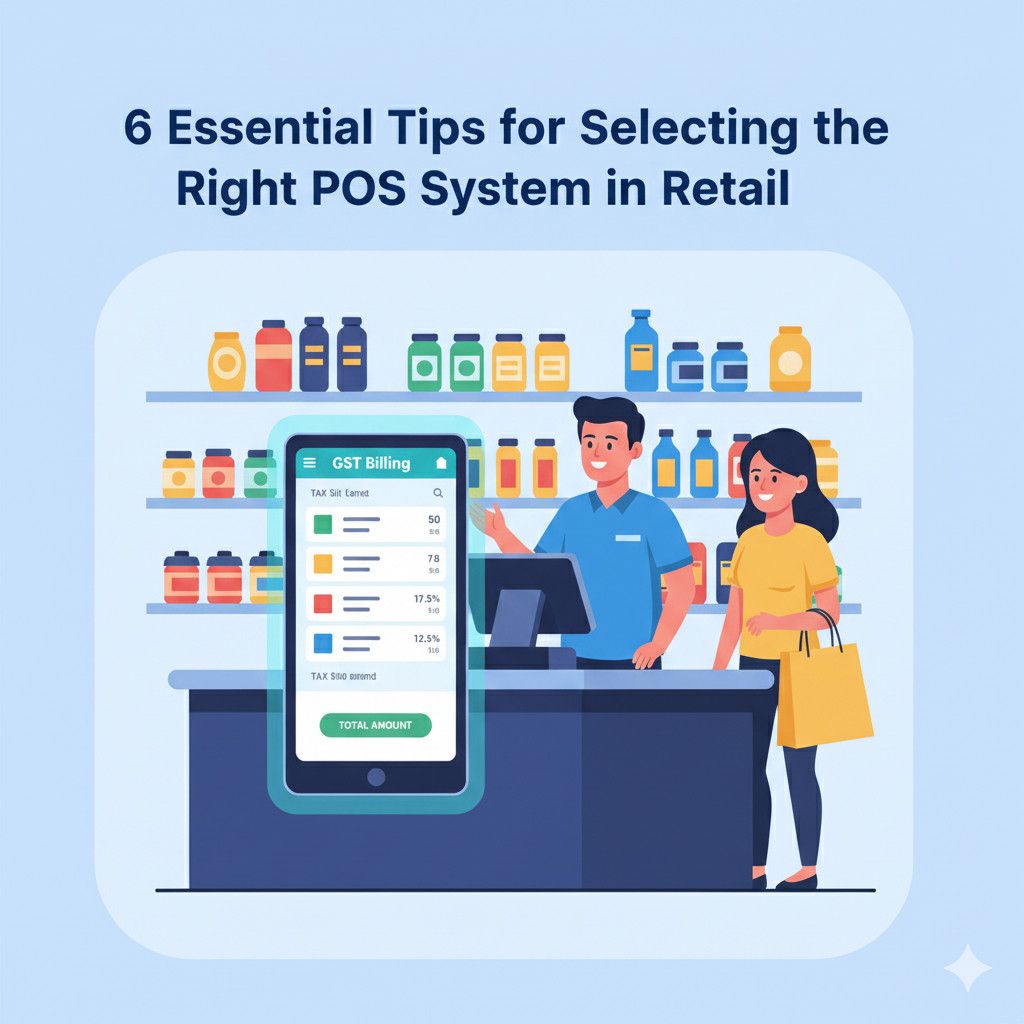In the rapidly changing landscape of retail today, Point of Sale (POS) systems are no longer just machines for ringing up sales, but the backbone for every business. Today, a modern POS system paired with a powerful GST billing software for an all-in-one solution can take a lot of the stress out of being a retailer—sales, inventory, tax compliant invoices, payment acceptance, customer data, and reporting can now all be managed in one seamless flow. What’s the catch? There are endless options. How will you know which systems are best? This matters, because the right POS systems with GST invoice features can not only make your life easier, but provide added benefits like improved customer experiences, tax compliant invoices, and long-term improvements to the annual bottom line. This article offers you six straightforward tips to help you select the perfect POS system for retail, with a specific look at the need for GST invoice compliance features, that also allows you to run a smarter and future-proof business.
Why Choosing the Right POS System Matters
A poorly chosen POS system can slow down transactions, create inventory mismatches, and lead to frustrated customers. On the other hand, the right POS solution can:
- Streamline checkout processes
- Improve stock visibility
- Enable multi-payment options
- Provide actionable insights with analytics
- Ensure GST-compliant billing and reporting
1. Understand Your Business Needs
Every retail business is unique—what works for a grocery store may not suit a fashion boutique. Before investing, define:
- Type of business: Retail, restaurant, pharmacy, or hybrid.
- Volume of transactions: High-volume stores need faster hardware and cloud syncing.
- Key features required: Inventory tracking, loyalty programs, or GST billing.
Pro Tip: Make a checklist of “must-have” vs. “nice-to-have” features to narrow down your search.
2. Ensure GST and Regulatory Compliance
For Indian retailers, compliance with GST rules is non-negotiable. Your POS must:
- Generate GST-compliant invoices
- Support HSN/SAC codesand proper tax bifurcation.
- Integrate with e-invoicing and e-way bill systems(if applicable).
Why it matters: A non-compliant system can lead to penalties, tax disputes, and loss of ITC (Input Tax Credit).
3. Look for Seamless Inventory Management
One of the biggest advantages of modern POS systems is real-time inventory tracking. This feature:
- Prevents stockouts and overstocking
- Syncs sales data with stock levels instantly
- Generates reorder alerts for popular items
Pro Insight: Some advanced POS systems indeed integrate with supplier platforms for automatic loss, saving time and reducing human errors.
4. Evaluate Payment Integration and Flexibility
Customers today expect multiple payment options beyond cash. A good POS system should support:
- UPI, credit/debit cards, wallets, and BNPL (Buy Now, Pay Later)
- Split paymentsacross methods
- Secure digital receiptsvia SMS or email
Why it matters: Payment flexibility enhances customer satisfaction and increases conversion rates.
5. Prioritize User-Friendliness and Training
An advanced system is useless if your staff finds it difficult to operate. Look for:
- Intuitive interfacewith simple navigation
- Quick billing workflowsfor high-volume sales
- Multi-user access with role-based permissions
- Training and supportoffered by the vendor
Pro Tip: Ask for a demo or free trial before purchase. This helps you evaluate how easily your staff adapts to the system.
6. Check for Reporting, Analytics, and Scalability
- Data- driven perceptivity help retailers make better opinions. Your POS should give
- Deals reports( daily, daily, yearly)
- Client perceptivity( fidelity, reprise purchases)
- Profitability dashboards for top- performing products
Also consider scalability — can the POS system grow with your business? If you plan to expand to multiple outlets, insure the system supportsmulti-store operation.
Additional Factors to Consider
- Cloud vs. On- Premise: Cloud POS offers inflexibility and remote access, while on- premise systems may suit businesses with limited internet access.
- Integration Capabilities insure comity with account software, CRM, ande-commerce platforms.
- Vendor Support Choose providers with dependable after- deals support, timely updates, and data security norms.
Selecting an appropriate POS system for retail is not merely about dealing with sales; it is a decision that impacts your entire business. From complying with GST to tracking your inventory, to customer interaction and profitability, the right POS ties everything together. When you assess your alternatives, begin by assessing your business needs: compliance with GST guidelines, simple inventory management, flexibility with billing, and whether or how the POS will grow in tandem with your business. A POS that has GST billing software built-in assures you will be effective and compliant with the law – streamlining daily processes while providing better planning for success in the long term.
- 6 Essential Tips for Selecting the Right POS System in Retail | GST Billing Guide
- Discover how to choose the best POS system for retail. Learn 6 key tips covering GST billing, inventory, payments, and customer experience.
- POS system, retail POS, GST billing software, point of sale, inventory management, retail technology, e-invoicing, payment integration, customer experience, POS tips
Related posts:
No related posts.



